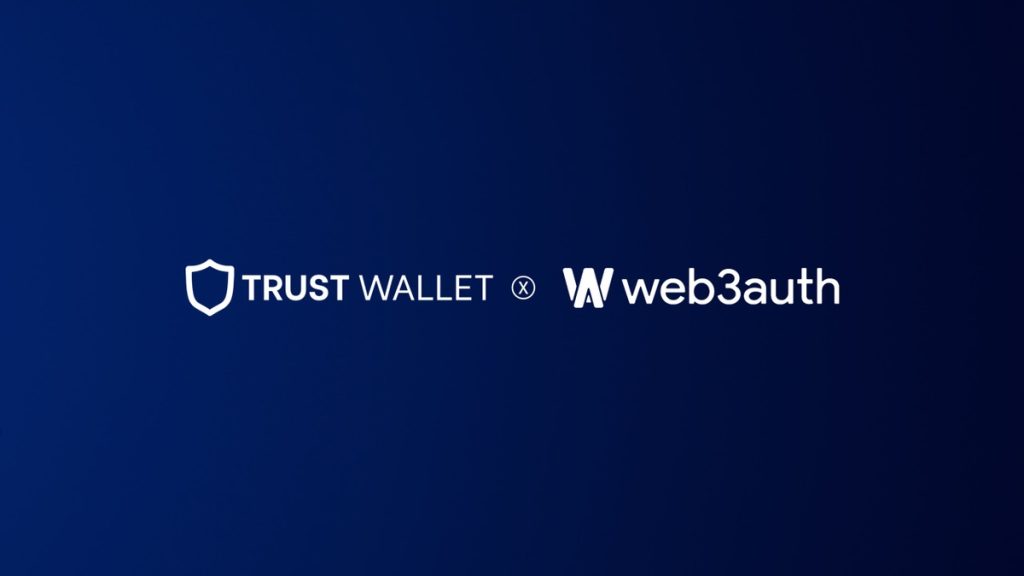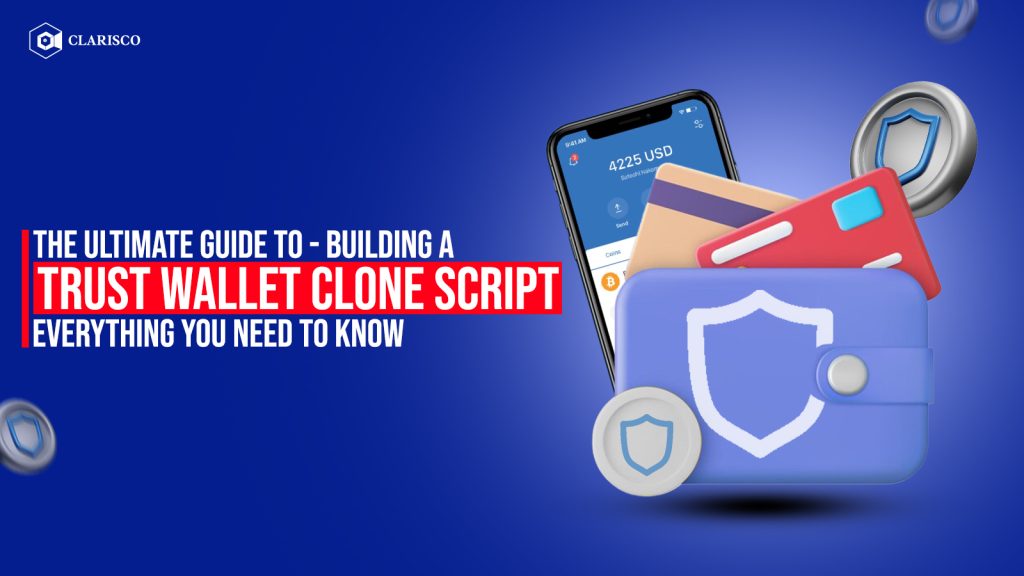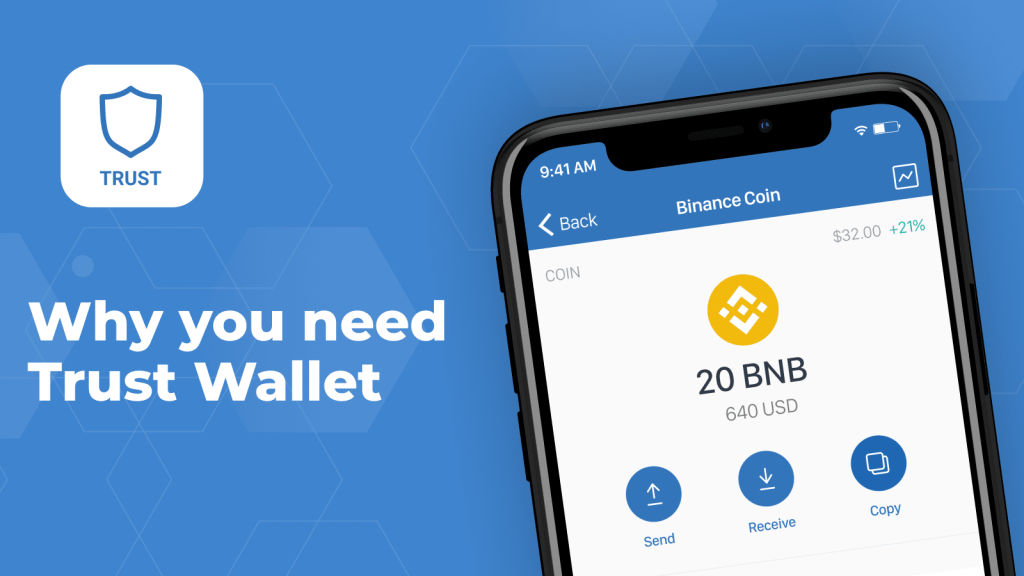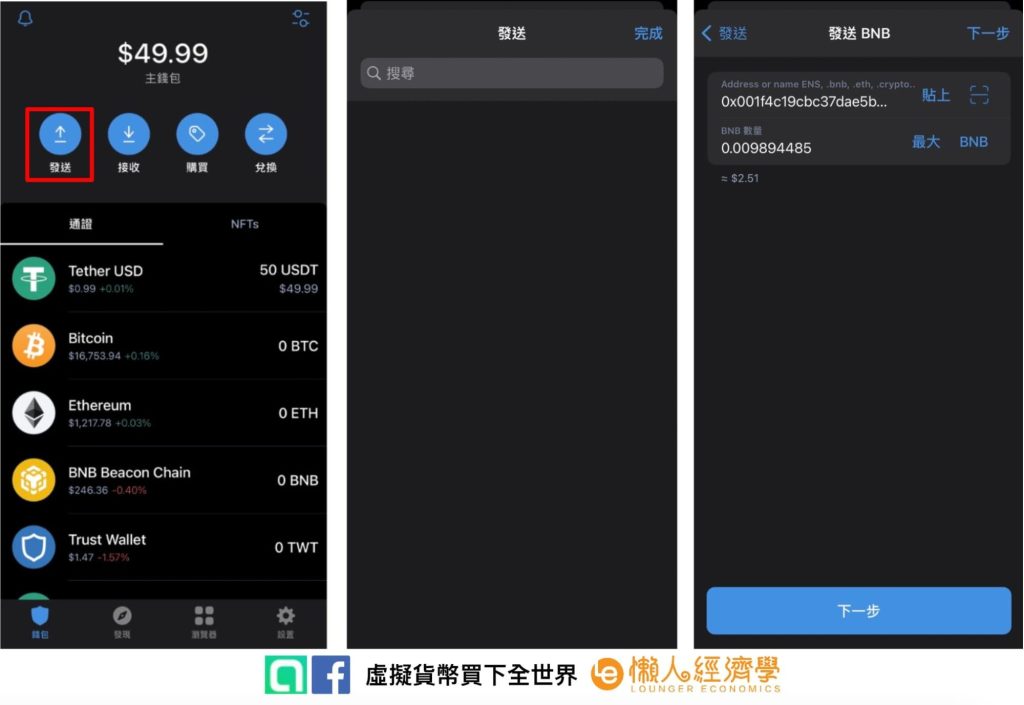
No, Trust Wallet is a non-custodial crypto wallet, not a bank account. It allows you to manage your own digital assets.
Trust Wallet’s Non-Custodial Nature
What Does Non-Custodial Mean for Your Funds?
-
Full Control: Users retain full control over their private keys and funds, ensuring only they can access their crypto assets.
-
No Third-Party Involvement: Trust Wallet doesn’t manage or store your funds, reducing risks of third-party hacks or failures.
-
Self-Sovereign: You are fully responsible for securing your wallet, empowering you with ownership of your assets.
How Does Trust Wallet Differ from Traditional Bank Accounts?
-
Decentralized Control: Trust Wallet operates on a decentralized network, unlike banks that rely on a central authority.
-
Ownership: In Trust Wallet, you have direct access and control over your assets, while banks manage and control your funds.
-
Faster, Cheaper Transactions: Unlike bank transfers, Trust Wallet offers near-instant, low-cost crypto transactions.
-
Crypto vs. Fiat: Trust Wallet is designed for storing and managing cryptocurrencies, while banks hold fiat currency.

Trust Wallet and Cryptocurrency Storage
Does Trust Wallet Hold Your Funds Like a Bank Account?
-
Non-Custodial: Trust Wallet does not hold or manage your funds like a bank account. Instead, it provides a secure, decentralized platform where you retain full control over your private keys and crypto assets.
-
No Centralized Control: Unlike banks that hold and manage your funds, Trust Wallet lets you store, send, and receive cryptocurrencies independently, without relying on a central authority.
How Does Trust Wallet Store Your Crypto Assets Securely?
-
Private Key Encryption: Trust Wallet encrypts your private keys locally on your device, ensuring that only you have access to your funds. This reduces the risk of hacking or unauthorized access.
-
Backup and Recovery: Trust Wallet offers a 12-word recovery phrase, allowing you to back up and recover your wallet if your device is lost or damaged, ensuring your assets are always accessible to you.
-
Secure Local Storage: Your private keys are stored securely on your device, not on centralized servers, giving you full ownership and control over your crypto assets.

Trust Wallet’s Role in Crypto Management
How Does Trust Wallet Help You Manage Your Assets?
-
Multi-Currency Support: Trust Wallet supports over 1 million cryptocurrencies and tokens across various blockchains, allowing you to manage a wide range of digital assets in one app.
-
User-Friendly Interface: The wallet provides a simple, intuitive interface for tracking your portfolio, managing assets, and viewing transaction history.
-
Built-In Exchange: Trust Wallet features an integrated decentralized exchange (DEX), making it easy to swap tokens directly within the app.
-
Staking and DeFi: Trust Wallet enables you to stake supported cryptocurrencies and interact with DeFi platforms to earn passive income.
Can Trust Wallet Be Used for Day-to-Day Transactions?
-
Crypto Payments: Trust Wallet allows you to send and receive cryptocurrencies quickly, making it suitable for everyday transactions and payments.
-
Low Transaction Fees: Using Trust Wallet for transfers often involves lower fees compared to traditional payment methods, particularly for international transactions.
-
Integration with DApps: Trust Wallet’s DApp browser allows you to interact with decentralized applications (DApps), facilitating various use cases like gaming, trading, and lending in the crypto ecosystem.
Differences Between Trust Wallet and Banks
How Do Trust Wallet and Banks Differ in Terms of Ownership and Control?
-
Trust Wallet: Trust Wallet is a non-custodial wallet, meaning you control your private keys and crypto assets directly. No third party has access to your funds unless you grant it access.
-
Banks: In traditional banks, your funds are held and managed by the bank. They have control over your account and can impose limits, fees, or restrictions on your assets.
-
Ownership: With Trust Wallet, you are the sole owner of your funds, whereas in a bank, the bank holds the funds and you have limited control.
Can You Earn Interest on Your Crypto in Trust Wallet Like a Bank?
-
Staking and DeFi: While Trust Wallet doesn’t offer traditional interest-bearing accounts, you can earn rewards by staking certain cryptocurrencies or participating in decentralized finance (DeFi) platforms directly within the app.
-
Crypto Earning Potential: By using Trust Wallet, you can potentially earn passive income through staking or yield farming, which are alternative methods of earning compared to a traditional bank’s interest rates.
-
No Traditional Bank Interest: Unlike banks that offer interest on savings accounts, Trust Wallet allows users to earn rewards from crypto-based activities, but it does not offer interest on holdings in the same way banks do.

Using Trust Wallet for Payments and Transfers
How Does Trust Wallet Facilitate Transactions and Transfers?
-
Sending Crypto: Trust Wallet allows users to send cryptocurrencies easily by entering the recipient’s wallet address, selecting the amount, and confirming the transaction. It supports a variety of cryptocurrencies and tokens.
-
Receiving Crypto: To receive funds, users can share their unique wallet address or scan a QR code directly within the app. Transactions are fast and secure, typically with low fees compared to traditional payment methods.
-
Token Swaps: Trust Wallet features an integrated decentralized exchange (DEX), enabling users to swap tokens directly within the app for more flexibility in managing their assets.
Can Trust Wallet Be Used for Sending and Receiving Payments Like a Bank?
-
Peer-to-Peer Transactions: Unlike banks, Trust Wallet facilitates peer-to-peer transactions, meaning you can send and receive payments directly without a third-party intermediary.
-
International Payments: Trust Wallet allows for instant and low-cost international payments, without the delays or fees commonly associated with traditional banks.
-
Crypto Payments: While banks manage fiat currencies, Trust Wallet enables payments in digital assets, making it ideal for cryptocurrency enthusiasts or those who prefer crypto transactions over traditional methods.

Security and Privacy in Trust Wallet
How Does Trust Wallet Ensure Your Privacy and Security?
-
Non-Custodial Design: Trust Wallet is non-custodial, meaning that users retain full control over their private keys and funds, ensuring that only you have access to your assets.
-
Encryption: Trust Wallet uses strong encryption to protect your private keys and sensitive data locally on your device, making it inaccessible to hackers or unauthorized users.
-
Backup and Recovery: The 12-word recovery phrase provided by Trust Wallet ensures that you can restore access to your wallet and assets if your device is lost or damaged, all without involving third-party servers.
-
Biometric and PIN Protection: Trust Wallet allows you to set up additional layers of security such as biometric authentication (fingerprint or face recognition) and a PIN code, further securing your wallet from unauthorized access.
Is Trust Wallet More Secure Than a Traditional Bank Account?
-
No Centralized Authority: Unlike traditional banks, Trust Wallet does not store or manage your funds, which reduces the risk of third-party data breaches or hacks that can compromise bank accounts.
-
Private Key Ownership: With Trust Wallet, you own your private keys, providing more control and security than a bank where your funds are managed by a third party.
-
Decentralized Security: Trust Wallet operates on a decentralized blockchain network, making it harder for attackers to manipulate or control your funds compared to traditional banks with centralized systems.
-
Limited Exposure to External Risks: Trust Wallet is immune to traditional banking issues like bank runs or centralization risks, offering a more secure, private, and user-controlled alternative for managing your assets.

Trust Wallet and Fiat Currency
Can You Store and Manage Fiat Currency in Trust Wallet?
-
No Fiat Storage: Trust Wallet does not store or manage fiat currencies like USD, EUR, or GBP. It is specifically designed for cryptocurrencies, allowing you to store, send, and receive digital assets.
-
Cryptocurrency-Focused: While you can’t store fiat in Trust Wallet, it supports a wide range of cryptocurrencies and tokens, giving you full control over your digital assets.
How Does Trust Wallet Integrate with Third-Party Services for Fiat-to-Crypto Transactions?
-
Fiat-to-Crypto Purchases: Trust Wallet integrates with third-party services like MoonPay, Simplex, and others, allowing you to buy cryptocurrencies using fiat money (credit cards, debit cards, and bank transfers) directly within the app.
-
Seamless Transactions: These third-party services handle the fiat-to-crypto conversion process, enabling users to easily purchase assets like Bitcoin, Ethereum, or Binance Coin and have them directly deposited into their Trust Wallet.
-
Secure Payment Methods: Through these integrations, users can safely use their fiat currencies to access the crypto market without leaving the app, with transaction fees and payment methods clearly outlined during the purchase process.
Does Trust Wallet Store My Funds Like a Bank Account?
No, Trust Wallet is a non-custodial wallet, meaning you control your private keys and crypto assets, not a centralized entity.
Can I Earn Interest on My Assets in Trust Wallet Like a Bank?
Trust Wallet does not offer traditional interest-bearing accounts. However, you can earn passive income by staking cryptocurrencies through integrated DeFi platforms.
How Is Trust Wallet Different From a Bank Account?
Trust Wallet is decentralized and gives users full control over their assets, unlike a bank account where funds are managed by a third party.

Leave a Reply